- Главная
- ООЗЖ «Эгида»
- Новости
- Каталог
- Форум
- Доска объявлений
- Энциклопедия
- Фото
- Видео
EGIDA.BY
Благотворительный портал защиты и прав животных
 Some methods that public services of Belarus use to combat fleas in the basements of apartment blocks and the way the sanitary regulations for fighting fleas affect the lives of cats and their owners.
Some methods that public services of Belarus use to combat fleas in the basements of apartment blocks and the way the sanitary regulations for fighting fleas affect the lives of cats and their owners. Belarus has no law against owners who throw their cats into the streets. Neither has it animal shelters which would accept cats surrendered by owners for some reason. Instead, Belarus has tough sanitary regulations relating to the areas where homeless cats live. These sanitary regulations prescribe no homeless cats to be kept in the basements and attics as cats can be the host animals for fleas. Fight against cats abandoned by their owners and seeking shelter in the basements of apartment blocks is a major headache for Belarus public utilities authorities and is sponsored by significant taxpayers funds.
The fighting method is but one: every basement hatchway, crack or hole is welded or closed up. The metal grille inserts covered with whole metal plates are installed across the hatchways. Ventilation air enters the basement only through small inlets having a diameter equal to the diameter of a human finger.
An extremely money-consuming solution. Air holes in the concrete walls of the basements are tapped or closed up with stones.
As pipes located in basements have to wait decades until they are replaced, their leakage is a common phenomenon which contributes to damp, hot and wet conditions. As a result basements becom a place of comfort for fleas and even worse - rats.
However, public authorities won't listen to biologists, environmental scientists, or virologists. They justify the war they have waged against cats by their belief that cats are the source of fleas.
The fight against homeless cats has toughened over the past few years.
Public authorities won't compromise over the issue although it hurts not only cats, but their caretakers, as well. The fight against cats and their painful death in basements is a tragedy for many metropolitan dwellers in Belarus.
People would take care of cats that live in the surrounding areas for years. They would get emotionally attached to the animals. For many of the lonely elderly caring for cats is their life.
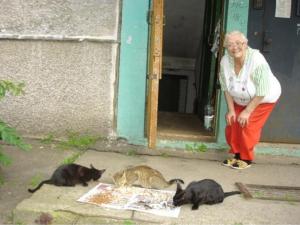
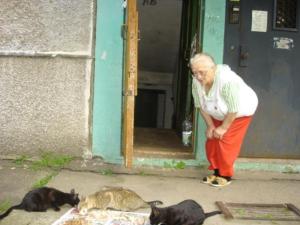
This is Valentina Labunova. She lives in Minsk on Kalinovskogo street. Valentina became eligible for a pension years ago. She has been teaching throughout her professional life and would not retire to be able to cover the costs of looking after the animals.
The painful death of pets in bricked-up basements is a tragedy for these people.
Here's one detailed example.
The example features an apartment block at 12 Rokossovsky Avenue in Minsk - the capital of Belarus. The cats lived in the surrounding area for years, as well as the house tenants caring for them.
The apartment block is very long, with 13 risers.
In May 2009, representatives of Minsk Public Utilities Service No. 82 installed the metal grille inserts across every hatchway and covered them with the metal plates. Not even the smallest hole in the walls was left.
Cats inhabited every basement room of the 13-riser apartment block. Workers closing up the hatchways were well aware of the cats left in the basement.
Week after week would the tenants of that apartment block approach Elena Makhnitskaya, the Director of the Public Utilities Service, pleading for the removal of constructions that blocked the exit routes for cats. Her stance was categorical. She said she would not let either the basement doors get opened or any vent holes drilled in the hatchways as she … disliked cats.
Stronger arguments, though, were generated by officials following the three subsequent months of appeals.
We hereby cite the statement of Minsk Leninsky district Administration as of 28 August 2009:
'…garbage was left in places where cats were fed and the basement was flooded with fleas which negatively affected the sanitary situation in the crawlway of the house'.
Arguments that animals locked up in the basement are condemned to starvation and death and that their dead bodies would begin to decompose thus posing a more serious epidemiological threat to the tenants were hopeless.
'The welding of air holes and the closing of hatchways were carried out after the basement area was inspected with no homeless cats found inside,' the district authorities supported the representatives of Public Utilities Service No. 82.
In the meantime, the cats locked up in the basement revealed their presence by pitiful mewing from behind the welded hatchways, their caretakers crying hopelessly nearby.
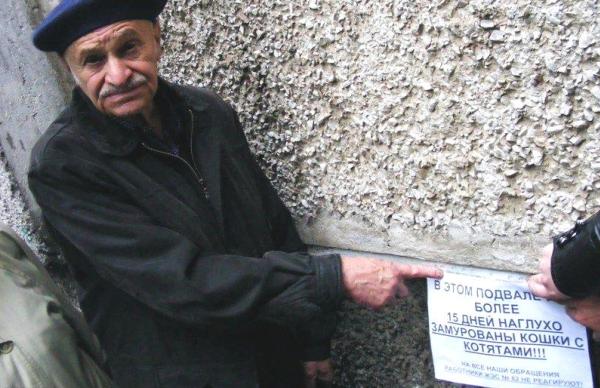
This photo features Kim Markovich Dyment, a retired officer, former Lieutenant Colonel, Engineer of the Soviet Missile Troops and Artillery.
Since 1982, he has been taking care after cats in the area surrounding his house, feeding them every day, giving medical treatment, rehoming kittens.
After the immuring, he and other caretakers spent a lot of time and effort trying to squeeze food beaded on rods through the narrow slit between the wall and the metal grille. Cats, who after the long and painstaking effort finally caught the food with their paws, were purring gratefully. People would pour water from the watering can to the small space between the grill rods.

Era Arkadievna Bogdanovich (on the left), an Honoured Lawyer of Belarus (1978), a retired Militia Colonel, was among those kneeling down to help the animals. Once an employee of the Soviet unit at the International Military Tribunal, she was an executive assistant at the Nuremberg process which was dealing with crimes against humanity committed by the leading Nazis. In her opinion, the situation is grassroots fascism.
On 16 June 2009, desperate for help, these people addressed animal protectors who called an emergency squad to rescue the immured animals.
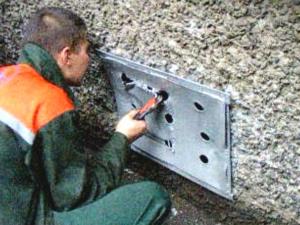
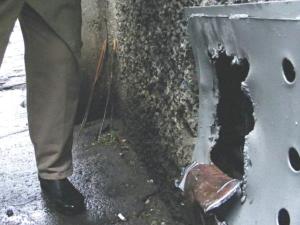
Holes large enough for a cat to pass through were cut in the metal plates. Photos and videos made in the course of the rescue operation show that animals were really present in the basement.
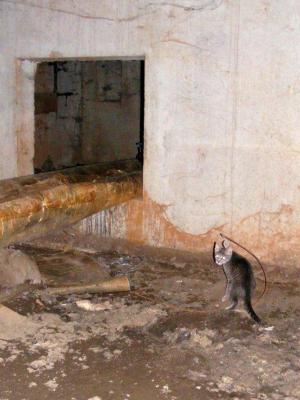
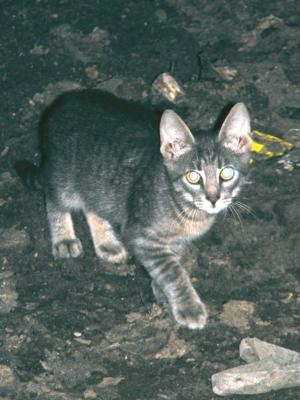
After the animals were freed by rescuers, animal protectors filed a complaint against officials of Minsk Public Utilities Service No. 82 under the Animal Cruelty Article.
The punishment under this Article of the Administrative Code is just a small fine or administrative arrest. There is no criminal responsibility for animal cruelty in Belarus.
A three months' long correspondence with officials at all levels including militia and public prosecution authorities was launched. On 3 August 2009, in a telephone conversation, the lawyer of the animal protection agency asked Roman Chebotarev, the Public Prosecutor of Minsk Leninsky district Public Prosecutor's Office, 'Why wasn't the complaint acted upon?' The official, too, said that he '… dislikes cats, but loves people.'
The response of officials at all levels where the complaint was circulating during these three months was that the public utilities representatives had been consistent with established norms.
A picture-perfect example is the statement of Minsk Leninsky district Administration as of 28 August 2009 quoted above.
It is so illustrative and typical for Belarus that we find it worth citing here in full:
*Translation of the document:
Minsk city executive committee
Administration of Leninsky district, City of Minsk
№ 01-26/821 from February 28, 2009
To Svetlana Anatoljevna Harkevich
On June 11 2009 you sent a letter to the police department of Leninsky district of Minsk about the cruelty towards homeless animals living on Rokossovskogo Avenue 12/1, Minsk. According to your letter, closing the hatches of the basement windows of the aforementioned house with grates has made it impossible for cats living in that basement to enter and to leave the building. This may result in deaths of cats which were locked inside the basement. You also demand to hold the persons responsible for this decision accountable.
However, the issue of the cruel treatment of animals is not within the competence of police. Therefore your materials were sent to Public Utilities Service of Leninsky district of Minsk.
During the first quarter of 2008 Minsk Public Utilities Service No. 82 installed metal grates in order to comply with the requirements of “Rules governing maintenance of apartment blocks in towns and settlements of the Republic of Belarus”, leaving gaps of 1-2 cm for ventilation in the basement windows.
In June 2009 an agreement between Minsk Public Utilities Service No. 82 and the animal protecting organisation “Egida” was concluded. It allowed for opening the hatchways for one month in order to give members of the animal organisation a possibility to take cats from the basement and distribute them among dwellers of the city. However, during the year garbage has collected from feeding the cats. Also, the number of fleas in the basement has increased considerably which resulted in worsening sanitary conditions. The number of stray animals has also grown. Because of such acting of members of animal protecting organisation “Egida”, the inhabitants of house 12/1 on Rokossovskogo Avenue filed many complaints to Minsk Public Utilities Service No. 82.
In response to abovementioned reasons, after inspection of the basement of the house (there were no stray cats left) Minsk Public Utilities Service No. 82 installed metal grating inserts to every hatchway and covered them with metal plates in August 2009.
Deputy Head of Administration/signature/V.F.Sigaj
-----------
While the complaint was going around authorities circle after circle, the workers of Public Utilities Service No. 82 welded up the hole in the hatchway anew.
It happened shortly after the Public Prosecutor of Minsk Leninsky district Public Prosecutor's Office said that he also 'dislikes cats.'
On the 7th of August 2009, animal protectors and tenants who visited Minsk Leninsky district Administration compelled the authorities to open up the basement for several days 'to take cats and kittens to arrange for their further care.'
The Cat Rescue Operation was carried out on 9 August 2009. Here are some photos of the operation.
The first photo features an adult cat which escaped. She was scared, broke away and disappeared in the basement. The cat had lived in the house for more than three years.
The second, third and forth photos feature an extremely weak kitten caught in the basement.
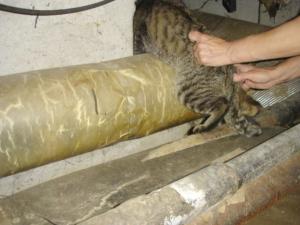
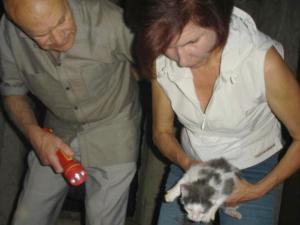
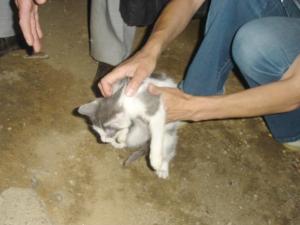
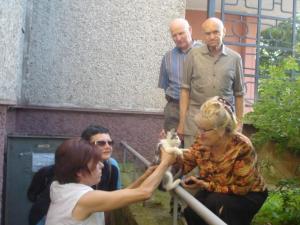
Cats were found both alive and dead.
Practically every basement closed up particularly thoroughly with three-layer metal grilles (at taxpayers' expense) has adult cats and kittens dying agonizing deaths without water and food. Have a look at them!
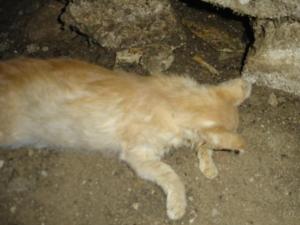
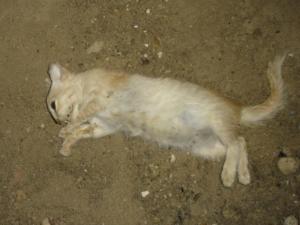
Cats' dead bodies decompose. They get infested with worms.
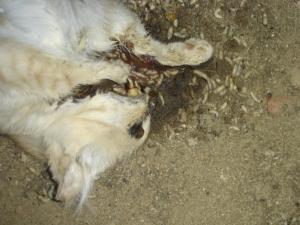
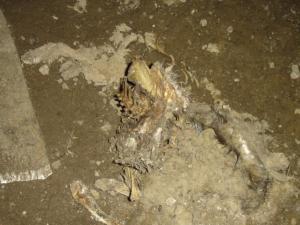
However, public utilities representatives and municipal officials keep insisting that it is live cats that boost flea reproduction in basements. What about the dead ones then? The question is rhetorical. No one cares about the answer.
Upon the instruction of Minsk Leninsky district Administration, Minsk animal control authorities were involved in the Cat Rescue Operation.
Three catchers wagons drove up to the house at 12 Rokossovsky Avenue the next day (11 August 2009).
The catchers service is a subdivision of Minsk-based Company "Fauna Goroda" run by Minsk City Administration.
It is worth mentioning that the company is supported by Minsk dog owners funds. Upon the decision of the MPs, the monthly fee the dog owners pay is appropriated for the company. The catchers you can see on the photos below collect animals throughout Minsk to be subsequently put down (a separate chapter in this book will be dedicated to this company).
So, on 11 August 2009, three catchers wagons arrived upon the instruction of Minsk Leninsky district Administration to catch the cats immured in the basement and subsequently euthanize them at "Fauna Goroda".
They entered the basement for 3 minutes and left it at once as according to the effective labour protection regulations they are forbidden to catch animals in basements. Instead, they took several cats strolling under the windows. All the cats had owners.
This is Valentina Mitrofanovna Moskalenko. When she saw the catchers taking her cats that were walking peacefully nearby, she collapsed, and the neighbours immediately called an ambulance.
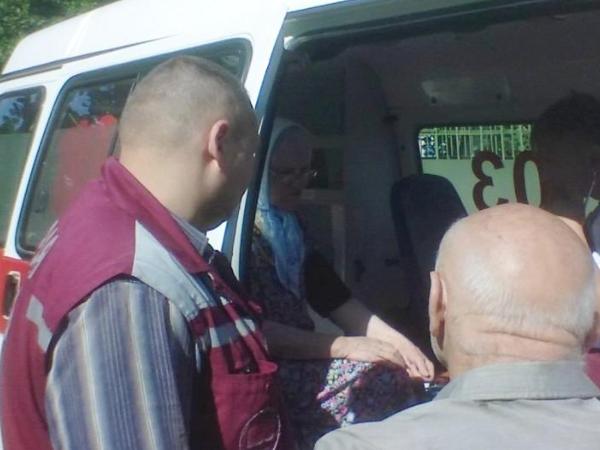
After giving an injection to the 81-years old woman doctors left. The woman watched a car brining away her cats which had been caught. She requested to leave the cats with her. The neighbors were running after the car and also asking to let the cats go. But the catchers drove off and didn’t even look at them. The thing is that catchers wages are directly proportional to the number of animals they catch.
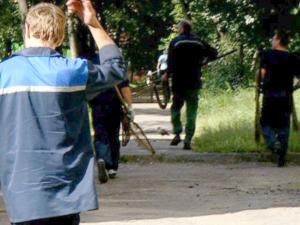
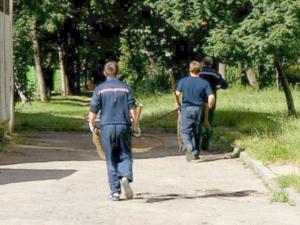
On the same day, 11 August 2009, Valentina Moskalenko, 81, took public transportation to get to "Fauna Goroda" located on the other end of Minsk to get her two cats.
She found only one of the cats in the cage, his nose broken. No one explained the absence of the other one.
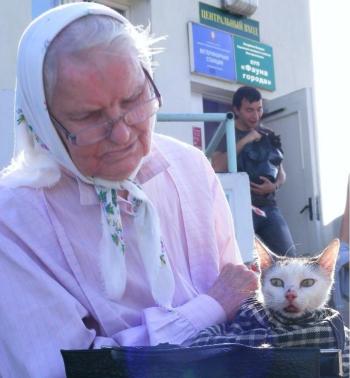
Valentina Moskalenko would not bring the cat home. The stressed animal broke from the old lady's bag while on her way home.
This is another example proving that there is no respect for human dignity and moral damage which affects human health is not rare when it comes to putting down pets in Belarus. For the sake of what? That is an another rhetorical question.
The above events around the Cat Rescue Operation took place 10 and 11 August 2009.
The correspondence with authorities lasted for three months. The three long months of the letter exchange between animal protectors, cat caretakers of the apartment block at 12 Rokossovsky Avenue in Minsk and Minsk officials. Only after a detailed complaint had been filed with Minsk City Public Prosecutor's Office with all the facts given and the photos attached, the materials were forwarded to Minsk Leninsky district Court which on 21 September 2009 passed the following judgment: 'Director of Public Utilities Service No. 82 Elena Makhnitskaya shall be subject to administrative arrest for a period of two days.' The judgment was based on photos featuring dead cats. If the photos had been featuring only cats that were still alive, no judgment would have ever been passed.
The case caused a stir among mass media.
The "SB Belarus Segodnia" ("Belarus Today", previously "The Sovetskaya Belorussiya) is a major periodical in the country.
The publication was issued on 3 of November 2009. Here are some statements from the article fully confirming the fact that public utilities authorities are the only decision-makers when it comes to the destinies of domestic animals (cats and dogs) and will enjoy government protection till the end.
According to the head of animal protecting organization “Egida” Natalia Belyanova, pensioners living in that house on Rokossovskogo Avenue appealed to them for help. The elder people had been taking care of the cats in the courtyard for twenty years, feeding them, and suddenly all windows in the basement were closed. It looked like a planned action. Is it really a fact that the Public Utilities Service decided to deal with the homeless kittens in such a heartless way? Who raised a hand against the defenseless adoptees, which were fed by the pensioners? Or is there an another side to the issue? The author of the article visited the house in order to interview its dwellers on that incident. Lily Vorobjova from apartment 152 said that cats were not the problem, but the fleas. Her neighbor added that her children suffer from an allergy and the cats lived just below their apartment. Other neighbors reported that a bad smell and dirt resulted from the increased number of cats. Certainly, people were not satisfied with the situation. However, nobody wanted a cruel solution. On the request of the Public Utilities Service No. 82, catchers of stray animals came to this house in July 2009. They caught five cats, two of them were given to the present animal protectors right away, the others were brought to a state-run temporary shelter. However, complaints continued. Thus, the Public Utilities Service No. 82 decided to act on its own. Two years ago its workers closed the basement-windows of the house with the gratings but on the request of one elder man one window was left open. Later, after telling him to remove the cats and checking the basement Public Utilities Service No. 82 closed the last window. Some time afterwards animal protectors came, opened the basement and found a dead cat. There are two sides to the story. Apparently, there was no malicious intent on the side of Public Utilities Service. On the other hand, animal protectors found an evidence of cruelty against animals. The question remains what exactly constitutes an act of cruelty from a legal point of view. The author of the article called a dozen lawyers, but none of them came up with a clear answer on this issue. Anyway, looking at the case, it seems that a precedent has been established. How to solve the issue of homeless animals? After all, the catchers have no choice but using nets which certainly does not look very pleasant. It could be that animal protectors, inspired by their “successful interference”, will paralyze the work of Public Utilities Service in future. Author: Elena Solovieva 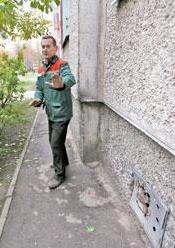 Recently an unprecedented case was decided in the court of Leninsky district of Minsk. The Director of the Public Utilities Service No. 82 Elena Mahnitskaya was sentenced to two days of administrative arrest for the cruelty to animals. The process had been initiated by the animal protectors. They assert that last summer workers of the Public Utilities Service No. 82 sealed cats with their kittens in the basement of the house number 12 on Rokossovskogo Avenue. Ghastly, of course. However, this story has many nuances, which also should be considered.
Recently an unprecedented case was decided in the court of Leninsky district of Minsk. The Director of the Public Utilities Service No. 82 Elena Mahnitskaya was sentenced to two days of administrative arrest for the cruelty to animals. The process had been initiated by the animal protectors. They assert that last summer workers of the Public Utilities Service No. 82 sealed cats with their kittens in the basement of the house number 12 on Rokossovskogo Avenue. Ghastly, of course. However, this story has many nuances, which also should be considered.
Photo: Vitaly Gil
Sovetskaya Belorussia, № 208 (23352) from November 03, 2009
See online http://www.sb.by/post/93178/
This case is not an exception. This is a commonplace phenomenon for apartment blocks in Minsk and many other Belarussian cities and towns. The only exception is the fact that the materials about the public utilities chief facing charges for immuring live cats eventually reached the court. Hardly will any other apartment block tenants ever take the plunge with a three months long correspondence compliant with the laws and supported by photos and videos.
However, the painstaking effort was not crowned with moral satisfaction for the tenants of apartment block at 12 Rokossovsky Avenue, who fought animal cruelty, but ended up a sad story for the live cats that had been left in the basement.
In the first days of November, after all Belarus mass media had published sensational materials about a public utilities chief sentenced to administrative arrest, the basement rooms of the long house at 12 Rokossovsky Avenue in Minsk were flooded with cleaners, plumbers, and animal catchers. Animal dead bodies were thrown into garbage cans.
This photo was taken late at night on the 3rd of November 2009. The garbage contains a kitten's dead body taken by plumbers out of the basement at 12 Rokossovsky Avenue. We don't know if it died by itself or was killed during cleaning of the basement.
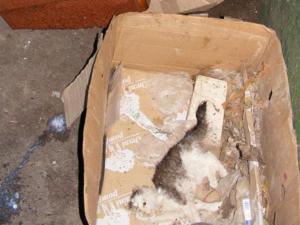
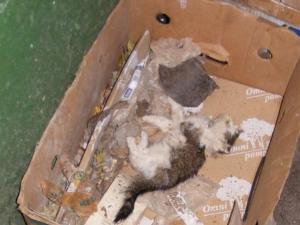
Every little hole in the basement was immured.
There were still live cats left in the basement. There, they left the cat whose tail you can see on the picture above. Her four kittens were with her. The cat was everyone's favourite. She had lived in the surrounding area for more than four years. Some time later her and her kittens dead bodies would be thrown cold-bloodedly into the same garbage can.
The tenants called Elena Makhnitskaya. She said toughly, 'This is the end! The cats are done away with!' Indeed…
Today the fact that a public utilities chief was found guilty of causing cat deaths in the basement has become an issue of public debate in Belarus.
One can come across the word 'Victory!' at some web-sites. Victory in this case means that it is the first case in Belarus when the act of cruel treatment of a cat was discussed in the court.
Is it a victory if the people who turned to animal protectors in May 2009 are suffering even more?
On this photo you can see dwellers of house number 12 on Rokossovskogo Avenu in Minsk. On 3 of November 2009 they stand next to the garbage container where a dead kitten's body lies. People are confused.
Did they think of such result when they started to fight for animal's right to live? No!
Will anybody follow their example? We think that not really…
What is the level of social development in Belarus if an official (E. Makhnitskaya) found by court guilty of 'animal cruelty' takes even tougher measures against animals and their caretakers?
We repeat that live cats immured in basements are a commonplace phenomenon for apartment blocks in Belarusian cities.
Some of the measures taken to prevent cats from inhabiting the basements of apartment blocks would be logical if the animals were taken to no-kill foster homes. Instead, cats are immured alive in basements or taken to temporary shelters where they are cruelly slaughtered.
This makes their caretakers suffer.
However, the government won't give up. No one cares about people's sufferings.
На сайте: 62
Гостей сайта: 61
Пользователей: 1
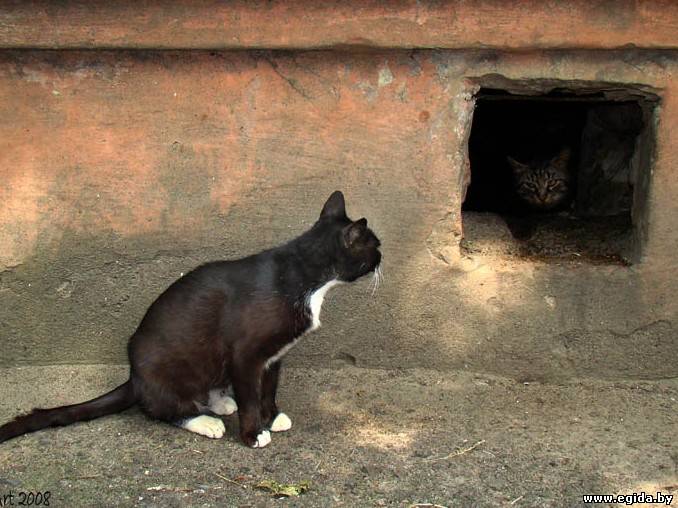
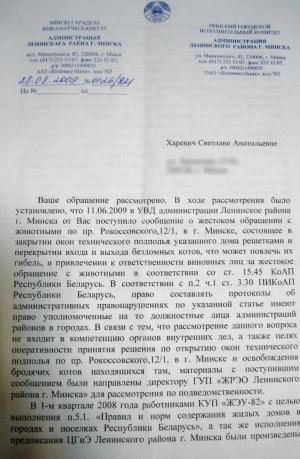
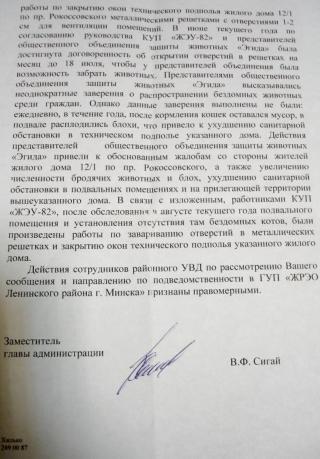
Your comment